The Democratic nomination race remains unsettled because many voters are conflicted between what they want and whether they think can win. Some candidates who generate excitement are also seen as risky. Progressive policies are popular but might be too liberal to win swing voters. And while voters say they are satisfied with their current selection of candidates, very few have actually settled on one.
So, across the early primary and caucus states through Super Tuesday, voters’ top pick continues to swing back and forth between Joe Biden and Elizabeth Warren, with neither able to break away.
Warren, whose support has dipped since last month, is seen by most as exciting; however, many also describe her as risky and worry her policy stances are too liberal to defeat President Trump, a sign that some of the recent critiques leveled at her may have slowed her momentum. Among Warren’s backers last month who now pick a different candidate, the bulk of them went to Biden and Pete Buttigieg.
Biden, who has regained the edge in both the poll and our delegate model, is described by most as safe but not exciting.
Bernie Sanders is holding strong in third place. Buttigieg has climbed into the top tier in Iowa and made big gains in New Hampshire.
Iowa now shows a clear top tier defined by Sanders, Biden and now Buttigieg — whose support in the state has tripled since September and risen seven points since just last month — and Warren, who was atop the list with Biden last month and has since dropped a bit.
In addition to his gains in Iowa and New Hampshire, Buttigieg has picked up support in the aggregate 18-state poll. CBS News recontacts voters for this study, and most of Buttigieg’s current supporters reported a different first-choice candidate last month, primarily Warren.
In recent weeks, Democratic voters have not grown more confident that their party’s eventual nominee will beat Mr. Trump. While most express some confidence, just 26% are very confident, a percentage that has barely budged since the summer.
There is concern among some Democrats that Sanders’ and Warren’s policy stances are too liberal to enable either of them to beat Mr. Trump, although it’s voters currently not supporting these candidates who are more likely to hold that view.
Overall, fewer think Buttigieg’s and Biden’s policy positions are too liberal to win. Most say their policy stances are about right for defeating Trump.
Along with policy stances, Democratic voters see different traits in different candidates. The poll presented a number of characteristics and asked whether they described each of the leading Democratic candidates. Far more Democratic voters describe Biden as “safe” than they do any of the other candidates asked about. At the same time, a third call him “boring.”
It’s not just Biden’s backers who call him safe. More than half of Democrats who don’t pick Biden as their first choice describe him as safe.
Warren and Sanders are viewed as “risky” more than the other top-tier candidates. Voters not considering these candidates are inclined to hold this view. Their own backers don’t feel they are risky. Most who view Warren and Sanders as risky also feel their policies are too liberal to beat Donald Trump.
Whether she’s safe or risky may not be the most important consideration for Warren supporters. Only one in five of them describe her as safe, indicating that a safe candidate is perhaps not the priority for them. In contrast, three in four of those backing Biden call him safe.
A majority of Democrats — 51% — describe Warren as “exciting,” the highest percentage for any of the candidates tested. Even among those who don’t pick her as their first choice, four in 10 call her exciting.
When voters are considering a candidate but not picking them as a first choice, it is concern about electability that holds them back. The poll asked voters what Biden, Warren, Sanders and Buttigieg could do to become a first choice among voters who are considering them. The top answer was convincing voters they could defeat Mr. Trump, which outpaced all other reasons tested, such as convincing voters that their policies would work or that they could handle the job of president.
An unsettled race
Just a third of Democrats in these early states say they have definitely made up their mind about the candidate they are currently backing, so minds may change.
Voters’ degree of confidence in beating Mr. Trump is related to how settled they are in their candidate choice. Most who are very confident of a Democratic win in the general election say they have definitely made up their minds, while those with less confidence are less likely to be certain of their choice.
While there may be some uncertainty, there isn’t much desire for more choices. Amid one late entry in the race and the potential for another, roughly eight in 10 Democrats in the early states are satisfied with the current field. Those who are uneasy about the party’s prospects next November are more likely to want more choices.
If former New York City Mayor Mike Bloomberg were to enter the race, one in five Democrats say he would be one of the candidates they would consider, but more than twice as many say they would not consider him. A third haven’t heard enough about him.
Bloomberg gets more consideration from older Democrats, and moderate and conservative ones. Biden and Buttigieg backers are more likely to consider him than Warren or Sanders supporters. Interviews for the poll were completed before former Massachusetts Governor Deval Patrick announced his presidential bid.
Iowa: Tight at the top
Buttigieg’s recent gains in Iowa have essentially transformed the contest into a four-way race.
Many Iowa Democrats see Buttigieg as exciting and down-to-earth. Just a quarter describe him as risky, but a similar proportion call him safe. Warren is also viewed by four in 10 voters as exciting, but more view both her and Sanders as risky.
As with the other leading candidates, the question of whether he can beat Mr. Trump is the main reason voters who are considering Buttigieg say they aren’t picking him as their first choice.
Buttigieg has been spending a lot of time and money in the state, and that may be paying off. He now leads among two groups of Iowa Democrats Warren led among last month: those paying a lot of attention to the 2020 candidates and college graduates.
Buttigieg and Biden are the top choice among older Iowa Democrats, while Sanders maintains his advantage with younger voters.
Warren is the top second choice across the early states and in Iowa, a state where a voter’s second choice has important implications. (If a voter’s first-choice candidate doesn’t have enough support to be viable, they can choose to align with another candidate.) A plurality of Sanders and Buttigieg voters pick Warren second. On the other hand, current Biden voters in Iowa are more likely to pick Buttigieg or Sanders second than Warren.
New Hampshire: Warren leads, Buttigieg rises
Warren continues to lead in the Granite State, followed by Biden and Sanders. Buttigieg is still in fourth place, but his support has increased by nine points since last month. He has improved with different types of voters — both men and women, as well as liberals and moderates alike.
Nevada: Biden overtakes Sanders
Biden has opened up a lead among likely Democratic voters in Nevada, giving him a 10-point advantage over Sanders. Back in September, Sanders held a razor-thin lead over Biden in the state, but support for the Vermont senator has declined slightly, while support for Biden and Warren has risen, dropping Sanders into second place and two points ahead of Warren.
South Carolina: Biden still strong
Biden retains a commanding double-digit lead over Warren and Sanders in South Carolina, where he continues to secure the support of nearly half of Democratic likely voters. A majority of black Democrats are supporting Biden, and one in three white Democrats pick him first as well.
Biden is the top choice in the state regardless of voters’ self-described ideology, and while Sanders has a strong lead among voters under 30, Biden leads among all other age groups.
Beneath the top tier, Buttigieg has passed Kamala Harris for fourth place in both South Carolina and Nevada, but with less than 10% of the vote, he trails the top three candidates significantly and falls short of the 15% threshold to earn delegates. Buttigieg’s rise is particularly striking among older voters. Since September, support for Buttigieg among voters 65 and older rose from 6% to 18% in Nevada and from 4% to 11% in South Carolina.
Medicare for All: Support slips; Democrats eager for details on cost
One of the top issues being debated in the Democratic campaign is Medicare for All and how to pay for it. Support for this type of health program has dipped some from earlier this fall: 50% of early-state Democrats now favor it, down from 57% in September. The percentages opposing such a program and saying it depends on the costs and details have both inched up.
Nearly two-thirds say that when they are comparing candidates’ health care plans they are mainly listening for details about how candidates would pay for them. Far fewer say that they are listening for larger policy goals and the details can come later.
Democrats who are not currently in favor of Medicare for All are more eager for details on how candidates would pay for their plans, compared to Medicare for All proponents. More than four in 10 Warren and Sanders supporters say they are listening for larger policy goals on health care and the details can wait, compared to just 27% of Biden supporters who say that – more of them are looking for details.
This CBS News survey was conducted by YouGov between November 6 and 13, 2019. A representative sample of 18,710 registered voters was selected in 18 states expected to hold early primaries and caucuses (Alabama, Arkansas, California, Colorado, Iowa, Maine, Massachusetts, Minnesota, Nevada, New Hampshire, North Carolina, Oklahoma, South Carolina, Tennessee, Texas, Utah, Vermont, Virginia). This sample includes 8,866 self-identified Democrats and Democratic-leaning Independents. This sample was weighted according to gender, age, race, and education based on the American Community Survey, conducted by the U.S. Bureau of the Census, as well as 2016 presidential vote. The margin of error is +/- 1.6 percentage points.
Source Article from https://www.cbsnews.com/news/pete-buttigieg-rises-in-iowa-new-hampshire-biden-back-atop-delegate-hunt-cbs-news-poll/

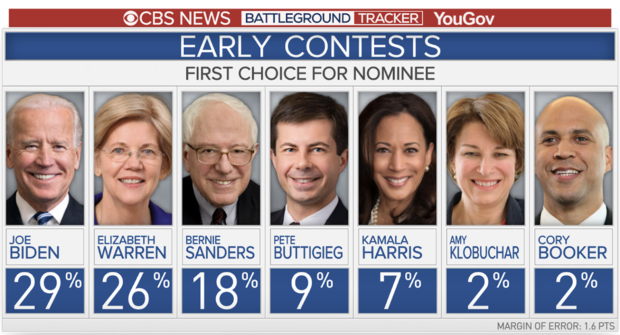
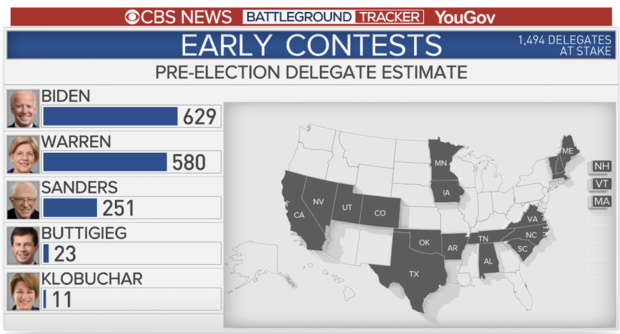
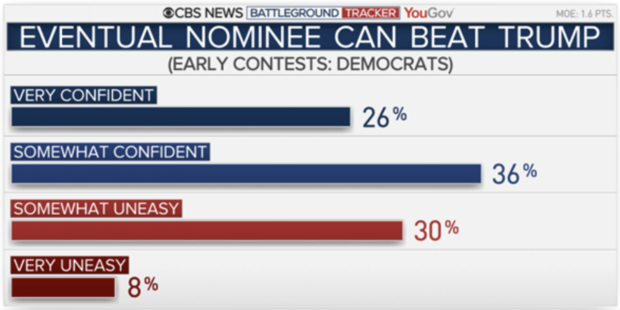
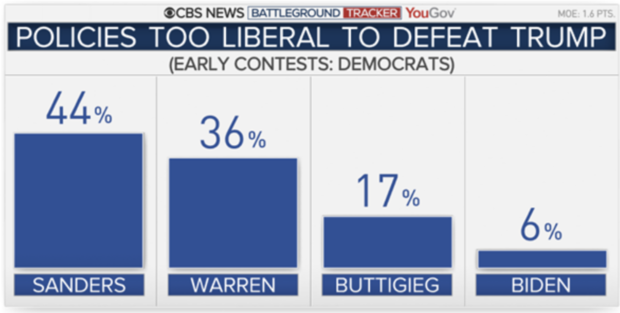
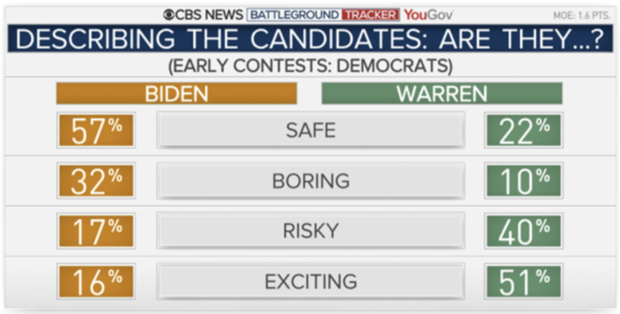
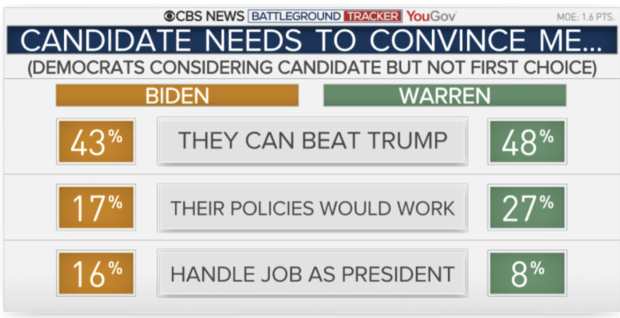
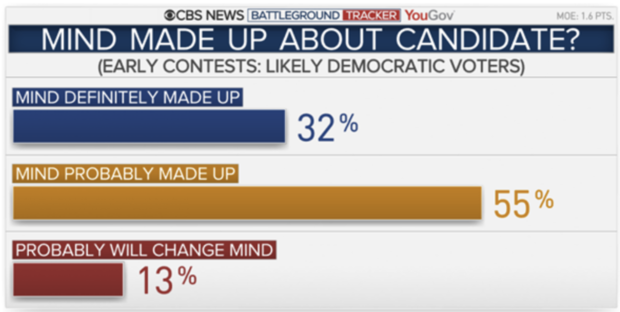
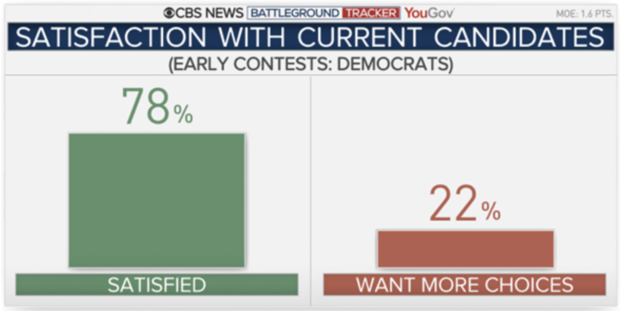
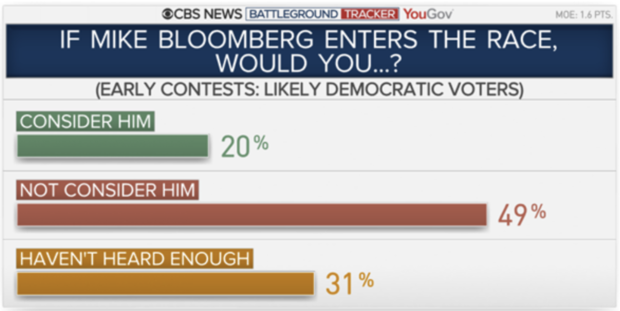
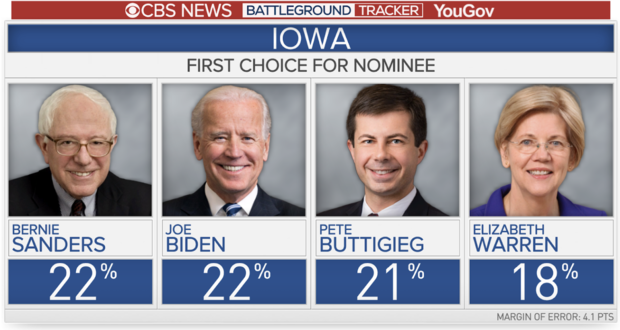
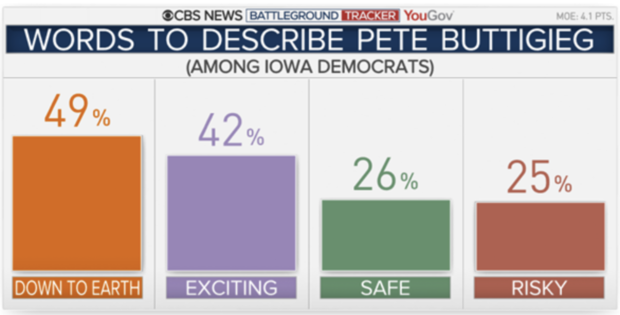
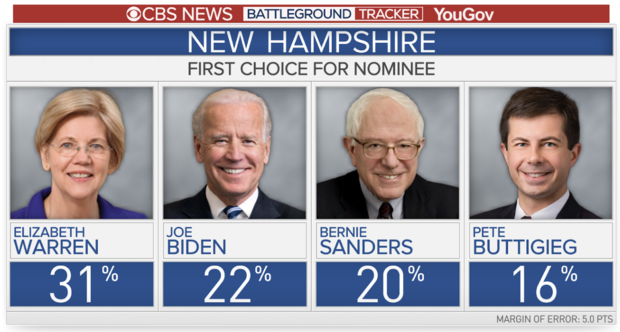
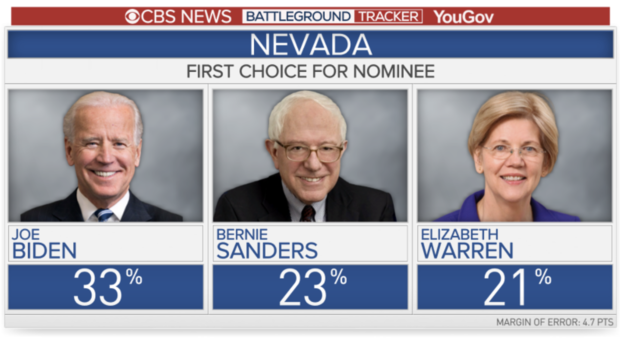
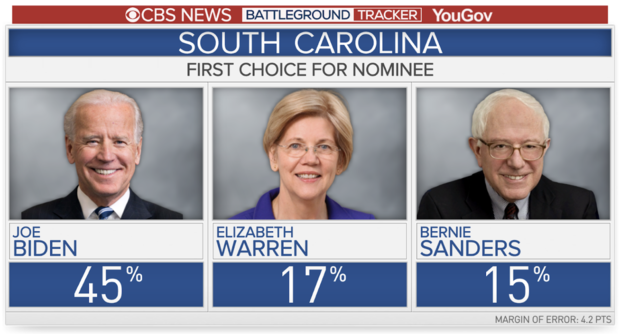
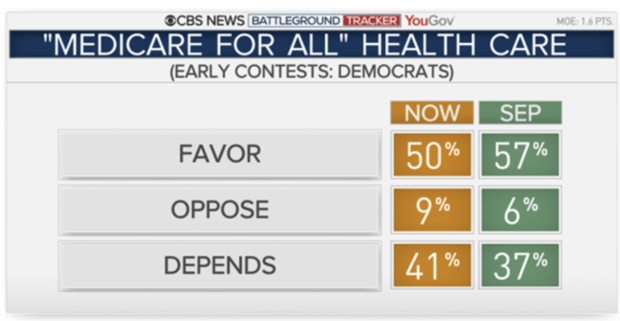
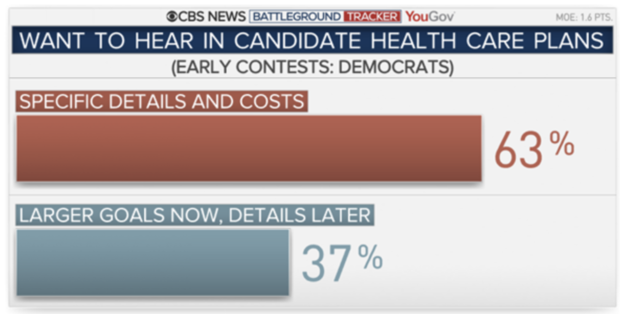

Comments